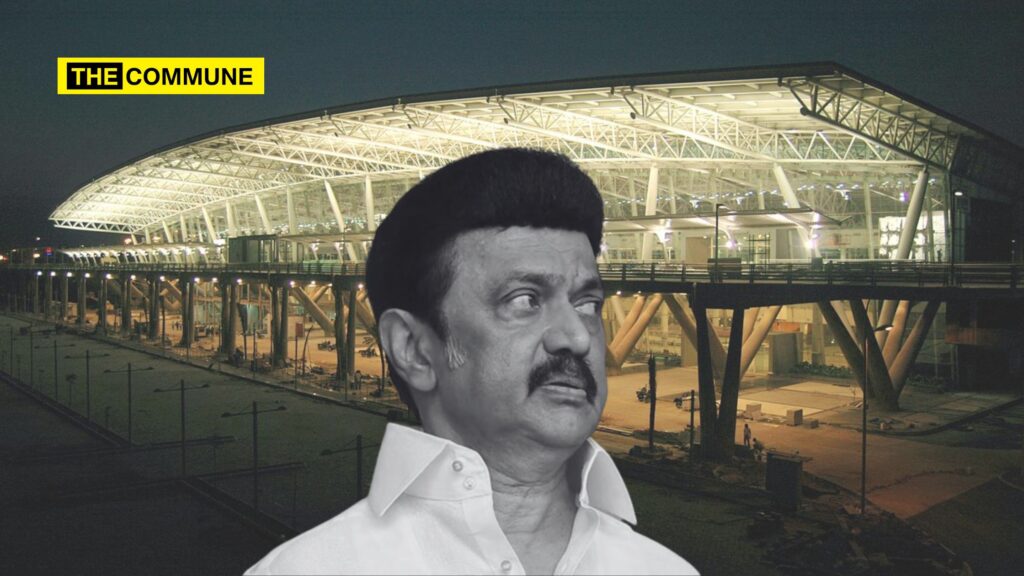Tamil Nadu Chief Minister M.K. Stalin announced on 27 June 2024 his ambitious plans to establish an international airport in Hosur. This plan can face significant hurdles due to existing guidelines prohibiting the operation of new airports within a 150-kilometer radius of Bengaluru’s Kempegowda International Airport (KIA) until 2033.
TN CM MK Stalin has announced plans to build a new international airport in Hosur spread across 2,000 acres with a capacity to handle 3 crore passengers per year.https://t.co/QlQqtjKA5a
— Akshita Nandagopal (@Akshita_N) June 27, 2024
It is noteworthy that the TN government is also working on the greenfield Parandur airport away from Chennai.
What Are The Legal Constraints?
The agreement between the Ministry of Civil Aviation and Bangalore International Airport Limited (BIAL), signed on 5 July 2004, explicitly restricts the development, improvement, or upgrading of new or existing airports within an aerial distance of 150 kilometers of KIA. This restriction remains in place until the 25th anniversary of KIA, which began operations in May 2008. The agreement grants BIAL exclusive rights to handle domestic flights, with exceptions made only for Mysuru and Hassan airports.
The agreement states: “No new or existing airport shall be permitted by GoI to be developed as, or improved or upgraded into, an international airport within an aerial distance of 150 kilometers of the airport before the twenty-fifth anniversary of the airport opening date.”
The proposed airport at Hosur, located just 74 kilometers from KIA, clearly falls within the restricted radius. Consequently, any attempt to develop a commercial airport in Hosur would require a No Objection Certificate (NOC) from BIAL, which has a track record of refusing such permissions. BIAL has previously denied permission for commercial flights to operate from HAL Airport on Old Airport Road in Bengaluru, citing the same agreement.
Despite the potential benefits of a new airport in Hosur, including reduced travel time for residents of southern Bengaluru and improved connectivity for the growing industrial town, the legal framework poses a substantial barrier.
Political And Economic Considerations
Chief Minister M.K. Stalin has emphasized the economic and social importance of the Hosur airport project, citing its potential to handle around 3 crore passengers annually and its role in supporting the economic development of Hosur, Krishnagiri, and Dharmapuri. However, the central government’s policy explicitly forbids the development of new airports within the 150-kilometer radius until 2033.
This situation creates a potential conflict between the Tamil Nadu government and the central authorities. Hosur is a significant revenue-generating region for Tamil Nadu, with major manufacturing industries such as Ashok Leyland, Titan, TVS Motors, and Ola’s e-vehicle factory. An airport would greatly enhance the movement of people and goods, boosting the region’s economic growth.
Aviation experts have criticized the viability of the Hosur airport, pointing out that poor infrastructure, in terms of road and rail connectivity, would deter airlines from operating there. It is argued that without proper planning and accountability, investing in such a project would be imprudent.
While the Hosur airport could provide numerous benefits, the current legal restrictions make its development highly improbable before 2033. The Tamil Nadu government faces a formidable challenge in reconciling its ambitious plans with the binding agreement between the Ministry of Civil Aviation and BIAL. The path forward will require careful navigation of legal, political, and economic landscapes, with the existing guidelines serving as a significant impediment to the realization of Hosur’s airport ambitions.
(with inputs from The Hindu)
Subscribe to our channels on Telegram, WhatsApp, and Instagram and get the best stories of the day delivered to you personally.

